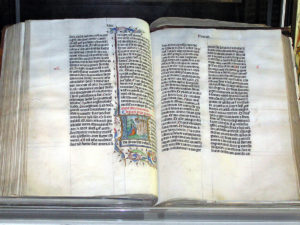The Letter of Aristeas (Part One)
NOTE: This is the first in a two-part series on one of the most significant fake letters in the history of the church. This essay will introduce the reader to the letter, explain what it says, and show the historical and factual problems with the narrative. A future post will address why the letter was written in the first place and will consider what truths might be contained in the letter.
The Letter of Aristeas, also known as Pseudo-Aristeas, is an important historical document in Septuagint studies, for it contains the earliest extant record concerning the origins of the Greek Pentateuch.[1] Nevertheless, as the name Pseudo-Aristeas suggests, there is controversy concerning the historical nature of the document. While the Letter claims to be written during the reign of Ptolemy II (285–246 BCE), most scholars date the letter to the mid-second century or later. Even if the narrative is wholly fabricated, it is nevertheless important, for it has shaped and fashioned subsequent thinking and scholarship. As Jobes and Silva indicate, “The letter is important as the likely source of all subsequent traditions concerning the Septuagint.”[2]
Our interest in the narrative is both historical and evidential. We want to know how the narrative has influenced scholarship through the years, but we also want to investigate what can be taken from the narrative as historically factual. To accomplish these goals, we will summarize the narrative, examine its historical problems, consider the purpose of the author in writing it, and finally evaluate what the letter reveals about the origins of the Septuagint.
Summary of the Narrative
The letter claims to be written by an Alexandrian Greek named Aristeas, who held a privileged position in the court of Ptolemy II, the king of Ptolemaic Egypt. He is writing to another Alexandrian, Philokratés, speaking of the events concerning the translation of the Hebrew Pentateuch into Greek. Though the Letter suggests it is about the creation of the translation, its purview is much wider, as we will see.
The initial reason for the translation, according to the Letter, was the desire of Demetrius, the Alexandrian librarian, to increase the size of the royal library (10).[3] Demetrius indicated to the king, Ptolemy II, that he had heard good things concerning the law of the Judeans, so the king asked why the law had not been added to the library. Demetrius answered that translation was necessary, and the king promised everything needed to accomplish the translation (11).
Before requesting able translators from Eleazar, the chief priest in Jerusalem, the king freed more than a hundred thousand Judean slaves, which the king described to Eleazar as being motivated by a desire “to act piously and render unto the supreme God a thank offering” (37). The king also sent along many treasures and riches.[4] In response, Eleazar and the inhabitants of Jerusalem offered sacrifices for the king and subsequently sent the requested translators.[5]
According to the Letter, these translators were no ordinary men. Their number totaled seventy-two, with six coming from each of the twelve tribes of Israel. Pseudo-Aristeas notes that “The High priest selected men of the finest character and the highest culture, such as one would expect from their noble parentage. They were men who had not only acquired proficiency in Jewish literature, but had studied most carefully that of the Greeks as well.” (121). Their ability to work together was also unparalleled, for “they were altogether above pride and never assumed an air of superiority over others, and in conversation they were ready to listen and give an appropriate answer to every question. And all of them carefully observed this rule and were anxious above everything else to excel each other in its observance” (122).
When the elders arrived in Alexandria, the king gave them unprecedented attention.[6] And when they revealed their fine skinned, gold-lettered copies of the Torah, the king “stood still for a long time and then making obeisance [i.e., bowing down] about seven times, he said: ‘I thank you, my friends, and I thank him that sent you still more, and most of all God, whose oracles these are’” (177).
The most developed section of the Letter occurs here, where the king tested the wisdom of the elders on seven consecutive nights at his festive gatherings (184–300). Each evening he asked ten of the elders a difficult question, and they each responded with wisdom. Pseudo-Aristeas’s summary was that the elders were far superior to the philosophers “both in conduct and in argument, since they always made God their starting-point” (235). As for the king, he directly said to his philosophers “It is my opinion that these men excel in virtue and possess extraordinary knowledge, since on the spur of the moment they have given fitting answers to these questions which I have put to them, and have all made God the starting-point of their words” (200).
After showing their great wisdom, the elders were led to an isolated island to do the translation. There after daily washing their hands in the sea to evidence their innocence from evil (305–306), they “set to work comparing their several results and making them agree” (302). Pseudo-Aristeas hints at divine providence at play in the quick and numerically precise completion of the project: “And it so chanced that the work of translation was completed in seventy-two days, just as if this had been arranged of set purpose” (307).
The translation was received well by Demetrius and by the Judeans of the region, who listened as it was read publicly. They with the priests, elders, and leaders of the people proclaimed, “since so excellent and sacred and accurate a translation had been made, it was only right that it should remain as it was and no alteration should be made in it” (310). Having made such a proclamation, they proclaimed a curse on “anyone who should make any alteration either by adding anything or changing in any way whatever any of the words which had been written or making any omission.” (311). Pseudo-Aristeas explained that such a curse “was a very wise precaution to ensure that the book might be preserved for all the future time unchanged” (311).
The king was also quite pleased with the translation, and after it was read to him it is said that he “was greatly astonished at the spirit of the lawgiver” (312). After inquiring why the law of the Judeans was not spoken of in the Greek historians or poets, the king was informed that divine curses fell on those who had previously attempted to do so (312–316). The account ends with the king bowing before the translation and commanding that “great care should be taken of the books, and that they should be sacredly guarded” (317). Afterward, he sent the translators back with great riches both for themselves and for Eleazar, the high priest.
Problems in the Narrative
There are numerous historical problems and improbabilities that prevent scholars from accepting the Letter as factually historical.[7] As for the historical problems, the chief is the identity of the librarian. Demetrius of Phalerum is a known historical character in Alexandria Egypt, but he was an advisor to Ptolemy I and was banished by Ptolemy II at his ascension. Further, even if he were present in Alexandria, he is never spoken of as a librarian. Another historical error concerns Menedemus, who was spoken of as present at the banquet welcoming the Jewish translators. But Menedemus had passed away prior to the end of Ptolemy I’s reign.[8] Finally, while the Letter indicates that six elders were chosen from each tribe, this would have been impossible after the destruction of the northern tribes by Assyria.[9]
The historical improbabilities are also significant. How would Aristeas, a Gentile, have such intimate knowledge of Jewish law and customs? The most significant improbabilities surround the king, however. Would a king release hundreds of thousands of slaves for the production of one book? Would he send such ludicrous amounts of gold and jewels to Jerusalem? Further, would the king of Ptolemaic Egypt have spoken of the Judaic God in such expansive terms, or have spoken to the High Priest of Jerusalem with such respect, as though speaking with an equal? One episode that far outstretches the bounds of credibility is the account of the king bowing before the Hebrew text seven times.
While other problematic historical, lexical, and geographical elements could be discussed, what is said above is enough to indicate the non-historical nature of the Letter. Why then was the Letter produced? We will address this question in the next post.
[1] R. H. Charles’s competent translation, originally published by Clarendon Press, is now freely available online: http://www.ccel.org/c/charles/otpseudepig/aristeas.htm. Thackeray’s presentation of the Greek text, originally published by Macmillan, is also available online: http://www.attalus.org/greek/aristeas1.html. For a helpful presentation of the Greek text on one page and the English on the opposite page, see Moses Hadas, Aristeas to Philocrates (Letter of Aristeas) (Eugene, OR: Wipf & Stock, 2007).
[2] Karen H. Jobes and Moisés Silva, Invitation to the Septuagint, 2nd ed. (Grand Rapids: Baker Academic, 2005), 23.
[3] The numbers in parentheses are the paragraph numbers as indicated in R. H. Charles’ translation. Robert Henry Charles, Pseudepigrapha of the Old Testament (Oxford: Clarendon Press, 1913).
[4] Verses 51–82 extensively details the exquisite and costly gifts.
[5] Pseudo-Aristeas also includes a lengthy description of Jerusalem, the priests, and the surrounding country in overly flattering terms (83–120). He also provides an extended defense of the law code, presenting it as from the mouth of Eleazar (128–171). This defense also includes a mild critique of idolatry (134–38).
[6] According to the narrative, the king usually did not see visitors until they had spent thirty days in the city. For very important visitors, that number could be shortened to five days. For these men, the king attended them immediately (172–75).
[7] Nina Collins is an exception in scholarship, for she believes the Letter is significantly factual, though she allows that there was some added embellishment. Despite her defense, however, very few have followed her perspective. Nina L. Collins, The Library in Alexandria and the Bible in Greek, Supplements to Vetus Testamentum 82 (Leiden: Brill, 2000).
[8] Melvin K H Peters, “Septuagint,” ed. David Noel Freedman, The Anchor Bible Dictionary (New Haven, CT: Yale University Press, June 1, 1992), 1096.
[9] Muller notes this as well, saying, “Apparently it is irrelevant for the context that nine and a half of the tribes had disappeared when the northern realm fell in 722 BCE.” Mogens Müller, The First Bible of the Church: A Plea for the Septuagint, Journal for the study of the Old Testament 206 (Sheffield, England: Sheffield Academic Press, 1996), 49.



